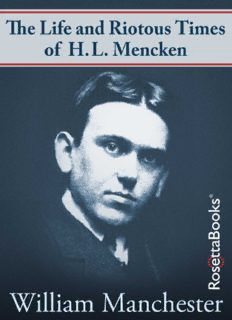
The Life and Riotous Times of H.L. Mencken PDF
Preview The Life and Riotous Times of H.L. Mencken
The Life and Riotous Times of H.L. Mencken William Manchester Portrait by Nikol Schattenstein LION OF THE TWENTIES Copyright The Life and Riotous Times of H.L. Mencken Copyright © 1950, 1951, 1975, 1976, 1983, 2013 by William Manchester Cover art, special contents, and Electronic Edition © 2013 by RosettaBooks LLC All rights reserved. No part of this book may be used or reproduced in any form or by any electronic or mechanical means, including information storage and retrieval systems, without permission in writing from the publisher, except by a reviewer who may quote brief passages in a review. Cover jacket design by Alexia Garaventa ISBN e-Pub edition: 9780795335648 To Julie Manchester with love and pride The liberation of the human mind has never been furthered by… dunderheads; it has been furthered by gay fellows who heaved dead cats into sanctuaries and then went roistering down the highways of the world, proving to all men that doubt, after all, was safe—that the god in the sanctuary was finite in his power, and hence a fraud. One horse-laugh is worth ten thousand syllogisms. It is not only more effective; it is also vastly more intelligent. —Prejudices, Fourth Series Any questioning of the moral ideas that prevail—the principal business, it must be plain, of the novelist, the serious dramatist, the professed inquirer into human motives and acts—is received with the utmost hostility. To attempt such an enterprise is to disturb the peace—and the disturber of the peace, in the national view, quickly passes over into the downright criminal. —A Book of Prefaces Contents Acknowledgments Introduction to the 1986 Edition CHAPTER I: PRECEDE CHAPTER II: COPY! CHAPTER III: THE FREE LANCE CHAPTER IV: MENCKEN, NATHAN, UND GOTT CHAPTER V: HOISTING THE BLACK FLAG CHAPTER VI: THE INFIDEL SCOPES CHAPTER VII: BANNED IN BOSTON CHAPTER VIII: AT A GALLOP, MUD-SPATTERED, HIGH IN OATH CHAPTER IX: SARA CHAPTER X: ALAS AND GODDAM ENVOI: MY OLD MAN Bibliographical Note Acknowledgments For their help in the gathering of the information here presented, the author wishes to thank Charles Angoff, Dr. Benjamin M. Baker, Mr. and Mrs. Harry C. Black, Julian P. Boyd, Huntington Cairns, Alfred Cohn, H. Lowrey Cooling, Paul de Kruif, John Dos Passos, R. P. Harriss, Arthur Garfield Hays, Theodor Hemberger, Mr. and Mrs. Joseph Hergesheimer, Mr. and Mrs. Gerald W. Johnson, Frank R. Kent, Alfred A. Knopf, Rosalind C. Lohrfinck, Hans Marx, August Mencken, Arthur Mizener, W. Edwin Moffett, George Jean Nathan, Hamilton Owens, John W. Owens, Paul Palmer, MacLean Patterson, Paul Patterson, Burton Rascoe, Dorothy Tillett, Edmund Wilson, and William W. Woollcott. August Mencken and George Jean Nathan must be thanked twice, each for reading the final manuscript through carefully, suggesting additions here, omissions there, and corrections everywhere. For the subject of this book, who answered all questions, however absurd, as long as he was able; who read the early chapters and had sections from the later chapters read to him; without whose co-operation no page that follows would have been possible—for him, mere thanks will not do. Like the A. Mitchell Palmer of his “Star-Spangled Men,” he should be “rolled in malleable gold from head to foot, and polished until he blinds the cosmos.” Introduction to the 1986 Edition “The cooks here do a swell job with soft-shell crabs,” Mencken said in a gravelly voice, peering at me over his spectacles. Beneath the old-fashioned center part of his white hair his pot-blue eyes gleamed like twin gas jets. “They fry them in the altogether,” he rasped. “Then they add a small jock-strap of bacon.” It was June 2, 1947. We were in the dining room of the Maryland Club, the bastion of Baltimore power. The meeting was our first—I had just flown in from a Midwestern graduate school, where I was writing my dissertation on his early literary criticism—and it was the beginning of a seven-year friendship, an April- December relationship which I cherished and cherish still. “This is a very high-toned club,” he said over the crabs. “Nothing but men. Any member who suffers a heart attack must be carried outside to the front steps before a nurse can attend him.” He was in fine form that Monday noon. At sixty-six he was still at the height of his remarkable powers and had, in fact, just completed the most productive period in his career. Since 1940 he had been feuding with Baltimore’s Sunpapers —the Sun, a morning paper, and the livelier Evening Sun. Disgusted with the publishers’ support for what he called “Roosevelt’s War,” he had refused to write for either. Instead, holed up in his study at 1524 Hollins Street, he had written his three Days books, A New Dictionary of Quotations, A Christmas Story, and two supplements to The American Language, and when we met he was at work on A Mencken Chrestomathy. His machete was still long and sharp and heavy, and he had never swung it with greater gusto. Face-to-face with the man himself, I was enormously impressed. He had once said there would be no point in erecting a statue to him, because it would merely look like a monument for a defeated alderman. Actually he was a man of great physical presence. To be sure, his torso was ovoid, his ruddy face homely, and his legs not only stubby but also thin and bowed. Nevertheless there was a sense of dignity and purpose about all his movements, and when you were with him it was impossible to forget that you were watching a great original. Nobody else could stuff Uncle Willie stogies into a seersucker jacket with the flourish of Mencken, or wipe a blue bandanna across his brow so dramatically. His friends
Description: